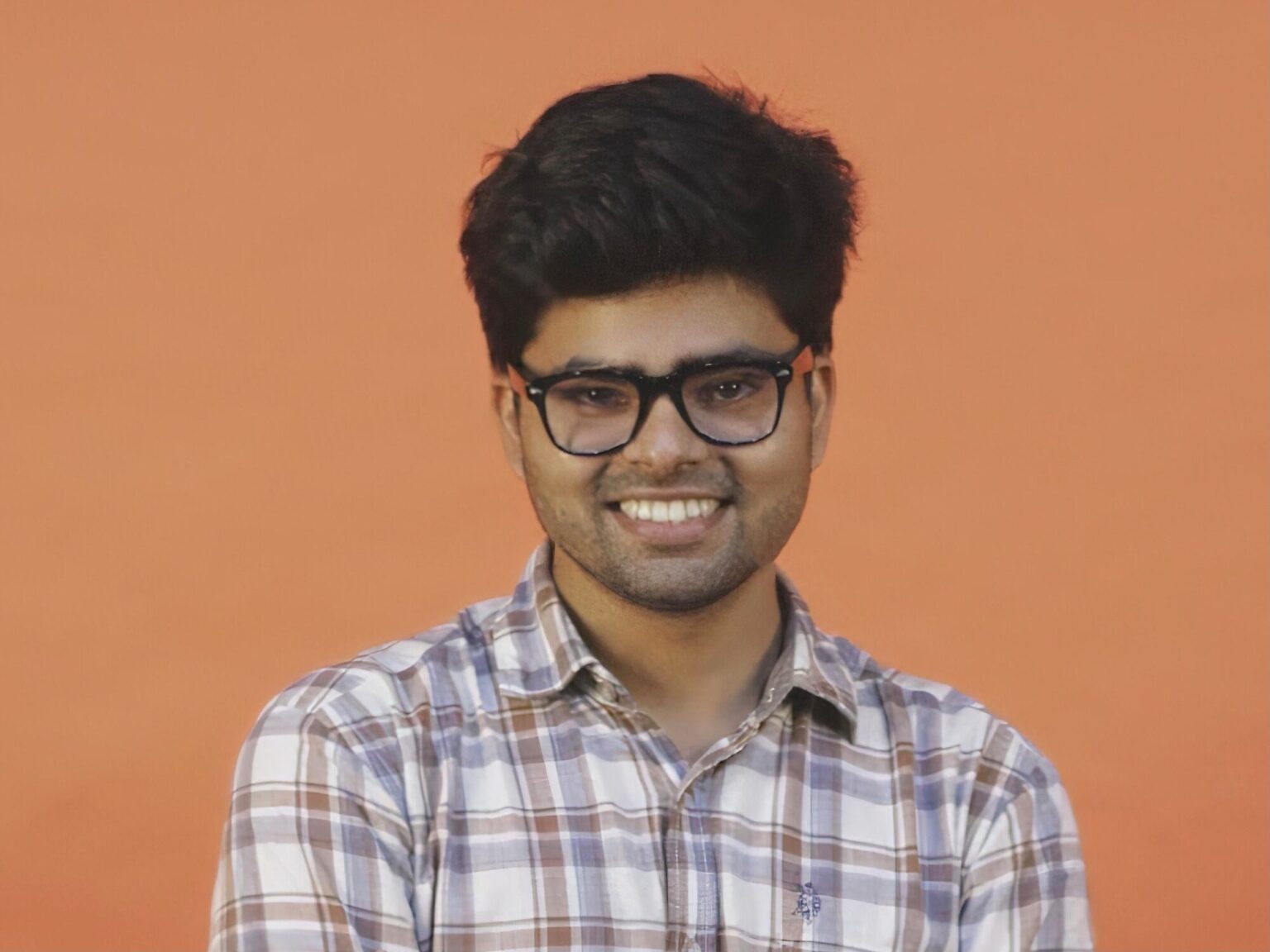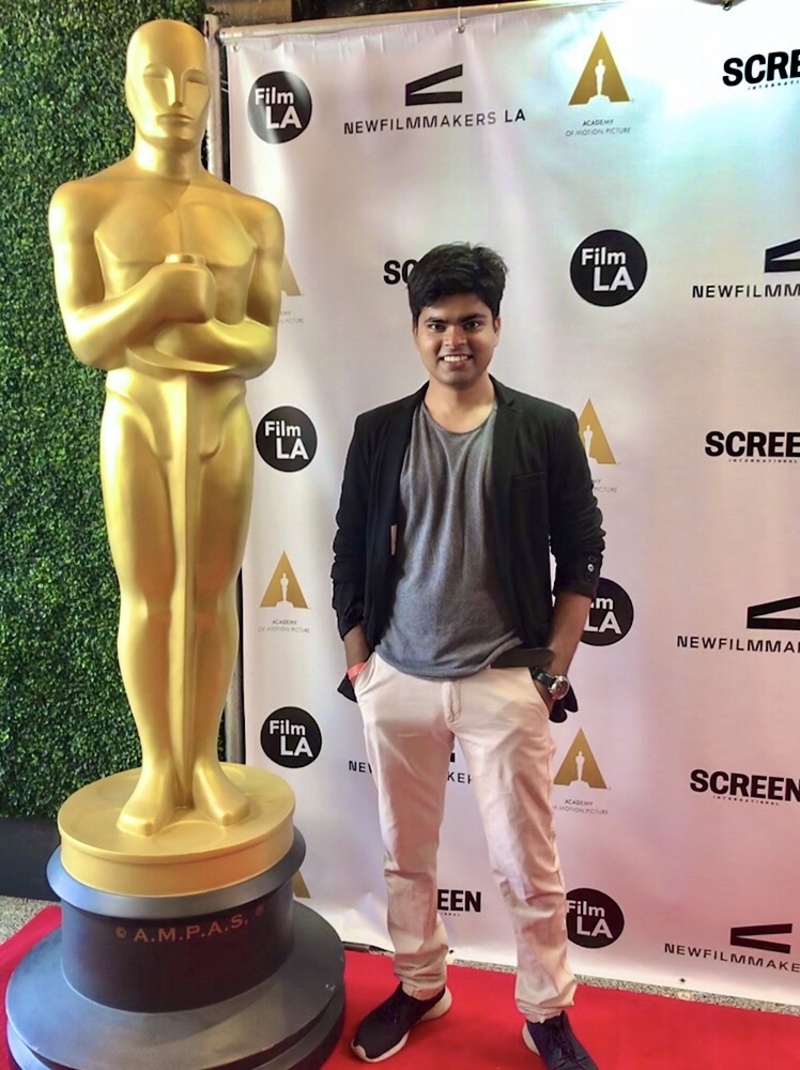
Art and ethos: Get to know film producer Arjun Yadav
Born & raised in Mumbai, India – Arjun Yadav has travelled far & wide to bring us only the best entertainment in film & TV. Not only does Arjun Yadav love being a producer, but you can also find some of his fascinating work as a recognized film critic!
You might already know Arjun Yadav from his short film The Strangers that quickly went viral with over 220 thousand views on YouTube alone. Since then, he has continued to think outside of the box and has produced a number of short & feature films, and was recently labelled as one of the top five producers at Lena Waithe’s inaugural Mentorship program.
Now, Arjun Yadav is ready to take the next step in the film industry at Wayfarer Studios and has taken a moment to fill us in on what it means to be a producer in the world of cinema.

Tell us about your journey into film. What did you do before becoming a filmmaker?
I had always found myself drawn towards more artistic pursuits. As a young adult, I drowned myself in the words of Kazuo Ishiguro and lay awake ruminating on the genius of Paul Thomas Anderson. My interest in movies was further stirred by my selection for the Young Critics Jury at 14th MAMI film festival out of thousands of students from Mumbai University after a rigorous multi-stage screening process.
As a jury member, I got a chance to interact with some of the most incredibly talented filmmakers, both seasoned and debutant, whose insights, imagination and trials and tribulations through the making of their films not only broadened my understanding of cinema but also inspired me later to make my own movies. This was my first ever exposure to art cinema and it was an instant attraction.
Until this point, I believed movies to be a form of entertainment, now the expression that cinema provides a window into realities & experiences which are beyond ours started making sense to me. In a dream-come-true moment, my writings on movies were picked up by leading national newspapers and magazines making me one of the youngest published movie critics in India.
Straight out of college and buoyed by my budding tryst with cinema, I made my first short film ‘The Strangers’, at the age of 21, for which I also cracked a distribution deal with Humaramovie, one of the biggest short film aggregators on YouTube.
Was there any particular film or TV show that inspired you to become a filmmaker?
So many come to mind but if I had to pick a few, I would probably say Cameron Crowe’s Almost Famous, PT Anderson’s There Will Be Blood, The Breakfast Club, The Social Network and Midnight in Paris. Among TV shows probably Mad Men. I’m yet to see a drama with writing more brilliant than Mad Men.

Who are your current influences?
I loved The Rider, so Chloe Zhao is someone I definitely look up to. I also immensely admire Paul Thomas Anderson & Pedro Almodovar. Lena Waithe as I have gotten to know her more has also made a huge impact on me.
Do you have any experience with mentors? If so, would you recommend them for up and coming filmmakers?
I consider Lena Waithe and Rishi Rajani as my mentors from the Hillman Grad Mentorship Lab Program – it’s an incredible community of artists anxious to make their mark in the industry. I think every filmmaker should seek mentorship provided it’s a good fit.
A good mentor isn’t someone necessarily who’s considered a big name in the industry but someone who would actually be able to devote his/her time to you and guide you along your journey.
What was the first project you worked on as Producer, and what did you learn from the experience?
My first short film here in Los Angeles was Totem Pole. This was the first movie I produced in Los Angeles and we had a budget of close to $15,000 to $20,000. When you’re working with big budgets it becomes all the more essential that every expense made helps raise the production value and overall aesthetic of the film. And it doesn’t necessarily mean getting the best or most expensive camera or equipment, but equal parts best equipment and a great crew to make the most of it.
Today, I have produced more than five acclaimed short films, most of which were SAG-AFTRA signatory. In 2019, I produced the short film Morning, a love story set against the backdrop of the Vietnam War. As a producer, I was involved in the development of the screenplay and managed to secure the location of Malibu Creek State Park, the same site where classic television show “M.A.S.H” was filmed.
For my producing work on Morning, I won the award for Best Producer at the Rome International Movie Awards 2021. The film itself was also a finalist at Sweden Film Awards and New York International Film Awards. In addition, AFTER, a film that I line-produced, was selected for the 2020 edition of prestigious Cannes Film Festival’s Emerging Filmmaker showcase.
In 2020, I was also a Unit Production Manager on the feature film A Place in the Field, directed by Nikki Mejia, a recipient of the Audi Fellowship for Women at the AFI Conservatory. In 2021, I was a Unit Production Manager on On our Way, another feature film produced by Siena Oberman & Heliya Alam, and directed by Sophie Lane Curtis.

What’s your favorite part of the filmmaking process?
I really enjoy producing. I’m not sure if I enjoy being on set much but pre-production is always fun. Developing a screenplay with the writer, hiring crew, auditioning actors, scouting locations, acquiring permits and insurance, that’s more of my thing. I’m not a micro-manager, I believe in empowering the crew and department heads to take accountability and do their best possible work.
Another great aspect of being a producer is that you’re doing a lot of problem solving throughout the production and staying calm and composed even during the most stressful of days. Not once have I ever lashed out at any member of my crew. No matter what the problem, I think there’s always a solution which doesn’t involve firing anyone.
Your first short film The Stranger was a huge success on YouTube, and arguably helped launch your career. Did you think you would see so much success so early on in your career?
I remember watching the rushes for the first time with my producer. We were laughing at the camerawork, direction and performance through most of it and before long we realized that we had finished watching all of it and there wasn’t a single shot we could point at and say, that is great, we could use that in the final cut. I think we tried to be too ambitious with the little resources that we had.
Long story short, we decided to cut it as short as we could and at a runtime of 5 minutes, we were able to mask most of its inadequacies. I still cringe every time I look at the movie. But I think what works for the film is the writing. And it’s one of the prime examples of how even if you try to make a terrible movie from a great script, it could still work but you can never make a good movie out of a terrible script.

By contrast, what was it like filming The Perfect Love Story, the most recent film you produced along with Jay Shetty?
Abhishek Joshi, super talented director of the film reached out to me last year about possibly producing it. I instantly connected with the story.
It’s about a man who falls in love with a woman over FaceTime whilst they are in quarantine but as soon as the lockdown ends and he tries meeting her, he finds out that things are not quite as they seem. We filmed under heavy COVID-19 restrictions in March at three different locations in Los Angeles.
As a producer I helped with the budgeting of the film, managing the finances, COVID compliance and securing all the necessary permits and shooting gear. Because Jay Shetty is involved – with his almost 12-15 million followers across social media – the film is bound to get a lot of attention.
Once the edit is complete, Abhishek and I will be taking this film to most Oscar-qualifying festivals and get it in front of as wide an audience as possible.

As your career moved forward, you started shifting into more executive positions. Do you prefer to work on set or in a more overhead role as an executive?
I feel fortunate in a lot of ways to have started my career as an executive. I worked in Marketing and Production in India for almost five years. And these were national media companies like 20th Century Fox Home Entertainment, Times Network, and DNEG India. This gave me an opportunity to be in the room where decisions of consequences were being made. Working on set is entirely different though.
There are a lot of moving parts, you need to talk to everyone from the actors to grip and electric to set PA, all are equally vital to the smooth functioning of the set. You need to know everyone’s name and you need to know what everyone’s job is. As a producer you’re constantly problem solving on set. If the day seems slow and boring, you’re probably doing your job right.
Since moving to LA in 2018, you’ve worked with some of the largest companies out there. What advice do you have for others trying to get their foot in the door with Fox, Netflix, and others?
Knowing someone within these companies would definitely help. This is the sad reality of the movie business. Majority of the people who get these jobs get it through referrals. So expanding your network and doing informational interviews is very important. It’s not about how many people you know, it’s about cultivating meaningful relationships with professionals within your network and keeping them updated on your career progression.

When you’re working on a project, you tend to wear multiple hats. How do you juggle so many responsibilities?
The key is to not get overwhelmed by the responsibilities and not trying to do everything by yourself and getting help and delegating whenever you can.
Do you consider yourself an indie filmmaker? If so, do you think you’ll always be one?
I am an indie filmmaker through and through. My education in cinema came via indie filmmakers; they were my early mentors and made a huge impression on me. That is not to say I don’t foresee myself producing an out and out commercial, mass entertainer at some point. But I’d love to maintain the balance and go back to my indie roots to make socially relevant, genre defying and original stories.
One of your most recent achievements was being selective for the executive track of Lena Waithe’s Mentorship Lab program. Why did you think that was the next step for you?
At the height of COVID-19 last year, there wasn’t much work going around, so I was constantly looking for new opportunities. I was also working part-time as an assistant at Variety which meant keeping an eye out on all the latest news in trades. I’ve always been a huge admirer of Lena & Rishi so when I learnt about the mentorship lab program, I got curious to see if I could meet the selection criteria.
I looked at the questionnaire and I was instantly overwhelmed by its depth & nuance. They were uniquely designed to dig into our artistic aspirations and creative vision. I stared at it for a while and eventually decided to just go for it knowing that there was no way I was competent enough to get into the program but weirdly it led to my answering these questions with the first thought that came into my head, and for some reason that worked. I don’t recommend it though haha.
What excited me about the program was the opportunity to work directly with Rishi Rajani and his development team. And unlike most labs or artist-in-residence programs, the mentorship lab is quite intensive and it’s over ten-months long.

What have you learned so far in your experience with the program?
We’re still in our early phase and there are so many aspects of the program that I’m looking forward to. Number one would definitely be getting to work directly with Rishi Rajani, President of Film & TV at Hillman Grad Productions and his development team.
The program also includes one-on-one instruction from industry experts, workshops set to enhance ingenuity in generating narratives, and professional development to polish and broaden our creative skills. We’ve been told we would get to produce table reads for the writing fellows and have opportunities to actively pitch and develop shows of our own.
Your most recent position is serving as the Production and Development Coordinator for Wayfarer Studios. How does that compare to past executive positions of yours?
I am currently working as a production and development coordinator at Wayfarer Studios which was recently recognized by Fast Company as one of the most innovative companies in media in 2020. My ethos is perfectly aligned with Wayfarer’s – I too am a strong believer in the power of stories to elicit political, cultural, and social change and want to produce movies and tv shows that are audacious and thought-provoking.

Where do you see yourself in five years?
Producing my own films and TV shows. Starting my own production company. I hope to produce at least 2 feature films in the next 5 years. Through my stories, I want to spotlight grievances, triumphs and human experiences of the underrepresented, marginalized and diminished voices. And what better place to begin that journey than at Hillman Grad and Wayfarer Studios.
What are five films you think everyone should see in their lifetime?
There Will be Blood – It’s incredible how PT Anderson made a movie about one man’s hatred for the world.
The Dark Knight – What every superhero movie should aspire to be.
Apocalypse Now – Brilliantly depicts the fantasia on the spectacle of war.
In the Mood for Love – An incredible love story of a married couple trapped in social bondage which makes the audience suffer as much as the leads.
Taxi Driver – How sanity & courage can prevail in the darkest, most violent of places.
If any director could direct the story of your life, who would you choose and why?
Paul Thomas Anderson because he’ll still find a way to make my uneventful life seem interesting and engaging.

What has been your biggest success and failure to date?
One of my other strengths I believe is my understanding of the ethos and sensibilities of art house cinema. It’s easier for me to figure out the source of inspiration behind a scene or a story from a mainstream Hollywood movie which more often than not is an auteur or art film. My development notes and building blocks of intention and obstacle in a screenplay all derive heavily from my passion for indie films.
Even during our development class at Chapman, I feel I had a leg up over other producers because I could identify the movies the writer drew on to craft his or her script and that allowed me to have a more productive and detailed discussion with them.
There are a few other aspects of my demeanor that I am most proud of – my insistence on making my own decisions, not being afraid to fail and not being afraid to risk rejections.
There isn’t anything anyone ever achieved without first being in the vulnerable position to invite rejections. But being vulnerable isn’t weakness, it’s a source of strength. It allows you to keep refining something, eliminating all its faults to a point of perfection. So each time you knock a different door, you’re a more advanced, less imperfect version of your previous self.
I’m not sure what I could consider as my biggest failure but I feel maybe I should’ve taken this deeper plunge into filmmaking a tad bit early in my career.
What’s next on the docket for you?
Continuing my full-time position at Wayfarer Studios in Production and contributing to the best of my potential to all the production operations for the studio.







